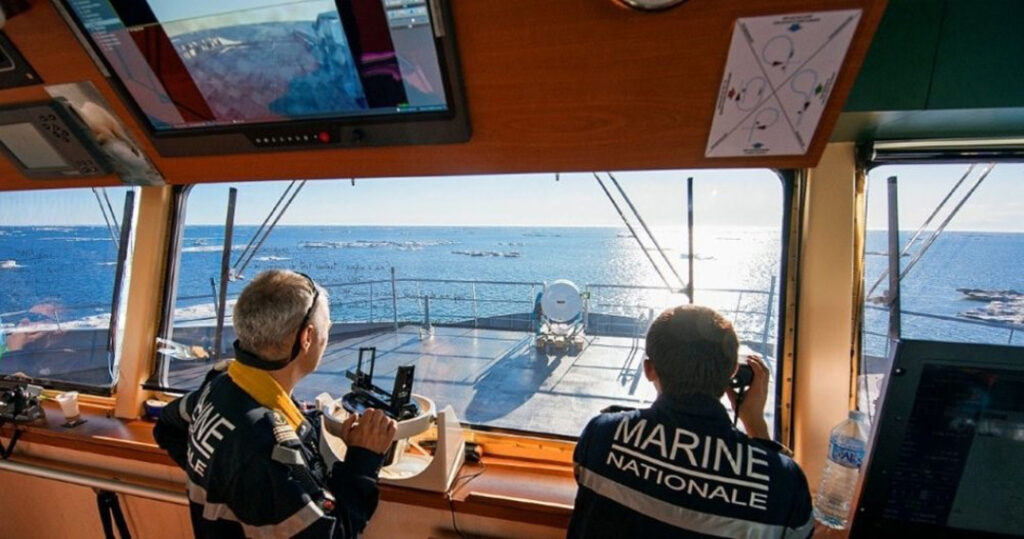HADRIENNE TERRES/FRENCH MINISTRY FOR THE ARMED FORCES
France’s commitment to the Arctic arises from an old involvement. The first polar expeditions from Jacques Cartier in the 16th century in the north of Canada led to a long-standing tradition of polar research. Fueled by the work of France’s scientific bases, in both the Arctic and the Antarctic, this scientific involvement resulted in France’s observer status in the Arctic Council in 2000.
On top of this scientific interest, the French private sector plays an active role in the Arctic with French companies operating in the region, mainly in the energy and tourism sectors. In 2016, the French National Arctic Roadmap stated France’s desire to develop a thorough knowledge of the Arctic environment with regard to issues such as resource exploitation, the environment and maritime safety. In April 2022, the first French polar strategy confirmed this analysis for the Arctic and stressed the need to strengthen the resources devoted to both the Arctic and the Antarctic to support this ambition.
The Arctic is now emerging as a secondary theater for great power competition. The militarization of its northern coast by Russia with the reopening of military bases, the potential spillover of tensions between Moscow and the allies, as well as the People’s Republic of China’s investment policies in strategic sectors (energy and infrastructures) contribute significantly to the need for reconfiguring the Arctic’s strategic environment. Consequently, the French Strategic Review of October 2017 considers that the region could eventually “constitute a space of confrontation” with interstate competition for the exploitation of its natural resources.
The impact of climate change in the Arctic makes this area a new frontier for the Euro-Atlantic theater. The northern Atlantic represents a key area for our defense posture as it offers both a strategic depth and an area of maneuver for our forces, especially in the anti-submarine warfare domain. It is also critical for securing vital transatlantic sea lines of communication (SLOC) in case of conflict. Any threat to the Arctic’s stability and security would have a direct impact on the northern Atlantic and on our security interests. This is why France monitors closely the strategic developments in the Arctic and increases its military presence in the region. The vision behind this engagement is clear: The Arctic must remain an area of peaceful cooperation.
Understanding an Unpredictable Environment
Environmental changes in the Arctic (warming ocean, rising soil and air temperatures, melting permafrost) will have implications far beyond the region itself. The consequences of these changes on security are diverse and far-reaching: They act as a risk amplifier, exacerbating existing tensions and crises. The Artic is especially vulnerable to these effects,adding a layer of unpredictability to the region’s already-challenged strategic environment.
The military reinvestment of Russia, already ongoing, could increase and lead to enhanced tensions, especially in light of Moscow’s invasion of Ukraine and considering the potential adhesion of Sweden and Finland to NATO. The SLOC could move even farther north than the current lines. The growing strategic importance of these lines has consequences for Russian military reinvestment in this area with development of anti-access/area denial capacities at the same time that China increases its investments in energy and transport infrastructures as well as its diplomatic engagement. An opportunistic partnership between Russia and China could have consequences in the Arctic.
Peace and Stability by Upholding International Law
To face this rapidly evolving strategic environment, France deploys military naval, air and land assets in the area on a regular basis for operational and training missions, and to experience the specific conditions of the Arctic, develop situational awareness, exert freedom of access, and cooperate with allies and partners:
- On a national level, the French Navy has made several deployments per year in the Barents and Norwegian seas since 2016. For the first time in its history, the French Navy crossed the Northeast Passage in total autonomy in 2018, demonstrating its capacity and interest in the new navigation channels. France also has a special brigade for mountain and polar warfare that deploys units in the Arctic every winter.
- On a multilateral level, the French Armed Forces increased participation in exercises, such as Arctic Challenge Exercise in the air domain and Nanook in Canada, since 2015, and within the framework of NATO (Cold Response since 2006 and Northern Viking 2022). Bilaterally, the annual search and rescue (SAR) exercise Argus with Denmark was set up in 2018.
Already sharing in securing this strategic area, France stands ready to further develop its cooperation with Arctic nations.
France works in close collaboration with the Arctic nations to achieve shared and legitimate objectives: ensuring freedom of action and upholding international law. Any attempt to prevent our forces from maneuvering, to contest access to the global commons or to take over natural resources should be dealt with collectively and with firmness. Multilateral frameworks such as the Arctic Security Forces Roundtable represent a crucial platform for sharing views, promoting cooperation and enhancing coordination to overcome the challenges.
Ensuring a shared understanding and increasing awareness has been a collective course of action, especially in the maritime domain. We have an opportunity to go further by integrating space and climate change into our prospective work. Climate change will increasingly affect our operational environment, adding uncertainty to an increasingly competitive area, and it is crucial to use space to monitor situational changes. (Pictured: French Navy Cmdr. Philippe Guéna, left, transits the Northeast Passage on the BSAM Le Rhône. The Northeast Passage is the shipping route between the Pacific and Atlantic oceans along the Arctic coasts of Norway and Russia.)
IMAGE CREDIT: FRENCH ARMED FORCES

